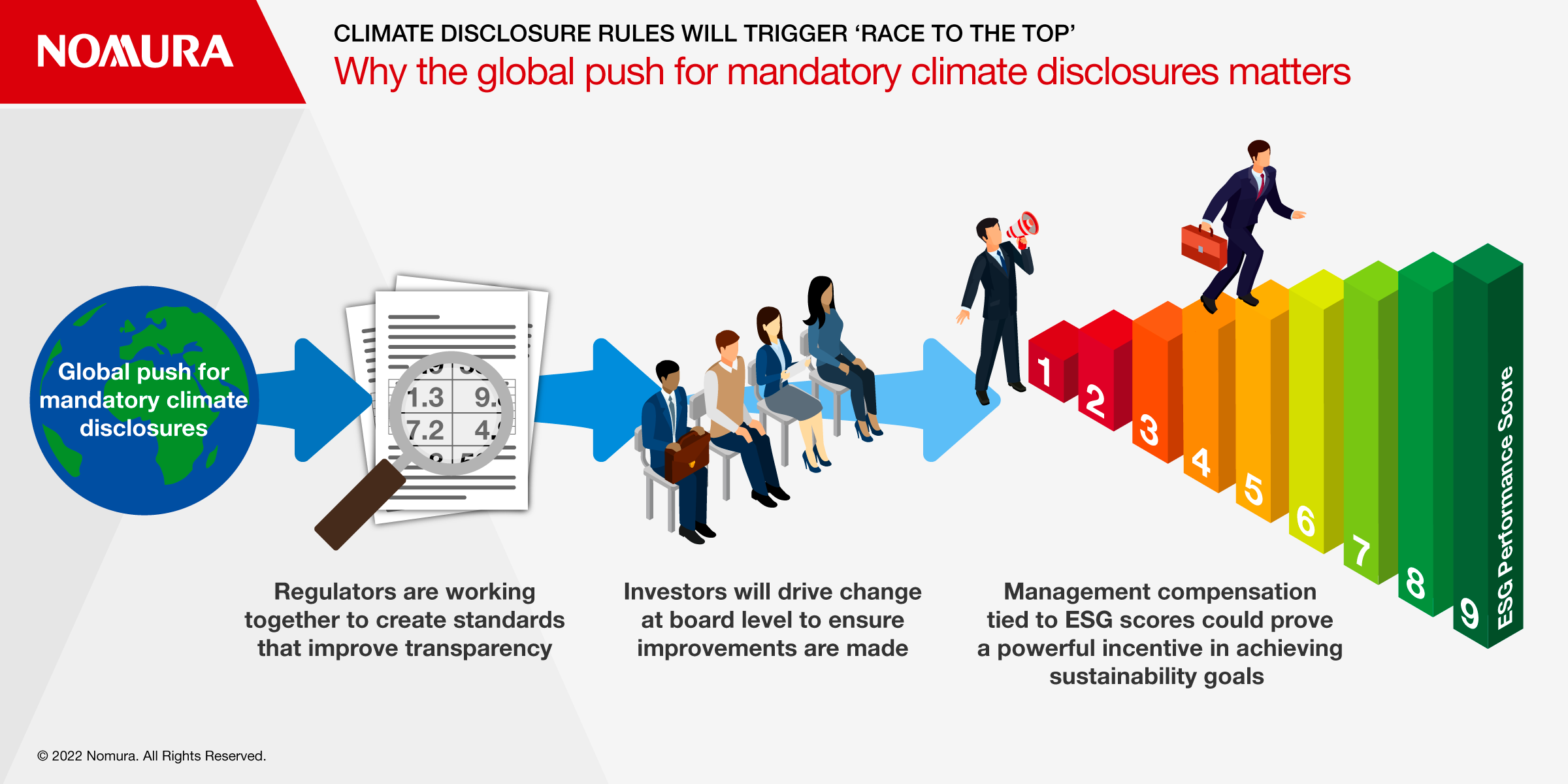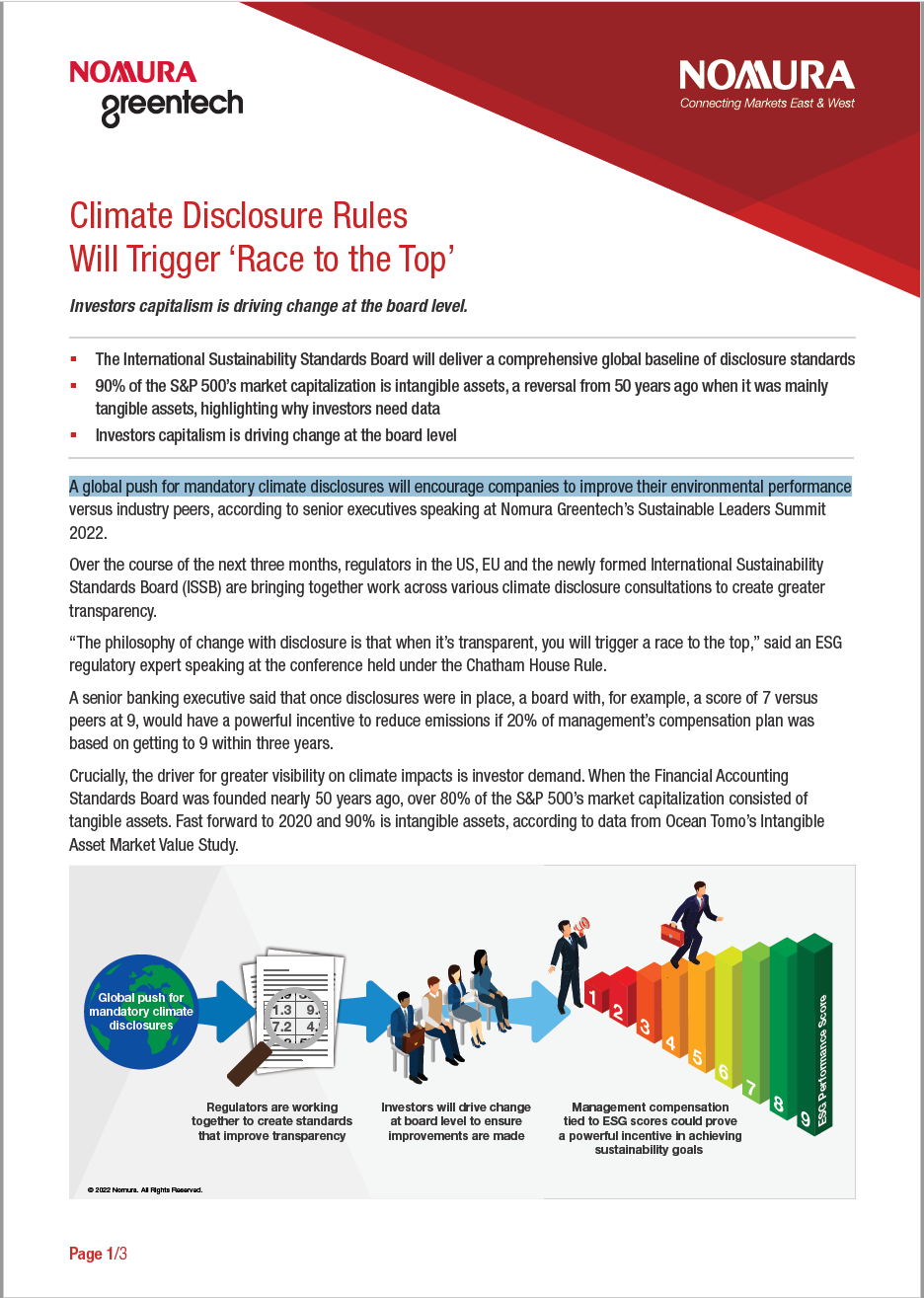Climate Disclosure Rules Will Trigger ‘Race to the Top’
A global push for mandatory climate disclosures will encourage companies to improve their environmental performance
- The International Sustainability Standards Board will deliver a comprehensive global baseline of disclosure standards
- 90% of the S&P 500’s market capitalization is intangible assets, a reversal from 50 years ago, highlighting why investors need data
- Investors capitalism is driving change at the board level
A global push for mandatory climate disclosures will encourage companies to improve their environmental performance versus industry peers, according to senior executives speaking at Nomura Greentech’s Sustainable Leaders Summit 2022.
Over the course of the next three months, regulators in the US, EU and the newly formed International Sustainability Standards Board (ISSB) are bringing together work across various climate disclosure consultations to create greater transparency.
“The philosophy of change with disclosure is that when it’s transparent, you will trigger a race to the top,” said an ESG regulatory expert speaking at the conference held under the Chatham House Rule.
A senior banking executive said that once disclosures were in place, a board with, for example, a rating of 7 versus peers at 9, would have a powerful incentive to reduce emissions if 20% of management’s compensation plan was based on getting to 9 within three years.
Crucially, the driver for greater visibility on climate impacts is investor demand. When the Financial Accounting Standards Board was founded nearly 50 years ago, over 80% of the S&P 500’s market capitalization consisted of tangible assets. Fast forward to 2020 and 90% is intangible assets, according to data from Ocean Tomo’s Intangible Asset Market Value Study.
“This is a big reason why we are seeing increased expectations for data outside of financial statements and why investors need high quality, useful information outside of financial statements,” said the ESG regulatory expert.
He added that mandating disclosures would help clear up some of the confusion after Tesla was removed from a widely tracked ESG index prompting Elon Musk to declare that “ESG is a scam that’s been weaponized by phony social justice warriors”.
Ratings are often subjective and can vary widely for each E, S and G component. A global baseline under the auspices of the ISSB, however, could go a long way in helping to compare companies and harmonize standards, he said.
The US Securities and Exchange Commission recently proposed a set of sweeping changes to its climate disclosure rules for public companies, requiring firms to report information on greenhouse-gas emissions and risks related to climate warming from their own operations (scope 1 and 2) and crucially from supply chains and end-consumers (scope 3).
In Europe too, change is afoot. Firms with regulated investment offerings are required to disclose information about their portfolio companies.
“You see a pincer move on investor corporate disclosures and what’s being asked of companies and investors doesn’t match up perfectly,” said the ESG regulatory expert.
Concerns around greenwashing are another big reason for mandating rules, he said, reflecting how the regulatory landscape is maturing from no disclosure, to a few leading companies and eventually the whole market.
A big point of contention arose around the merits of mandating Scope 3 emissions with one delegate arguing that without making it mandatory, a company could outsource its operations and look great on scope 1 and 2 while its emissions are actually hidden in scope 3.
On the flipside, gaining good data on companies with dozens of small suppliers is challenging and could lead to poor data inputs creating an inaccurate picture.
What’s more clear is the direction of travel. A board advisor to a listed company noted that a recent shareholder meeting extended to 5.5 hours due to dozens of questions on ESG.
This was echoed by the banking executive who recounted a recent discussion with the CEO of a sovereign wealth fund who explained that if he receives 100 letters a month from stakeholders, 98 say the organization isn’t doing enough on sustainability.
The banking executive said that through investor capitalism it’s achievable for a company in the bottom quartile to reach the median without much cost yet a huge difference on emissions.
“If their customers and boards care, that will turbocharge change,” he said.
Download a PDF of the full whitepaper
Disclaimer
This content has been prepared by Nomura solely for information purposes, and is not an offer to buy or sell or provide (as the case may be) or a solicitation of an offer to buy or sell or enter into any agreement with respect to any security, product, service (including but not limited to investment advisory services) or investment. The opinions expressed in the content do not constitute investment advice and independent advice should be sought where appropriate.The content contains general information only and does not take into account the individual objectives, financial situation or needs of a person. All information, opinions and estimates expressed in the content are current as of the date of publication, are subject to change without notice, and may become outdated over time. To the extent that any materials or investment services on or referred to in the content are construed to be regulated activities under the local laws of any jurisdiction and are made available to persons resident in such jurisdiction, they shall only be made available through appropriately licenced Nomura entities in that jurisdiction or otherwise through Nomura entities that are exempt from applicable licensing and regulatory requirements in that jurisdiction. For more information please go to https://www.nomuraholdings.com/policy/terms.html.

